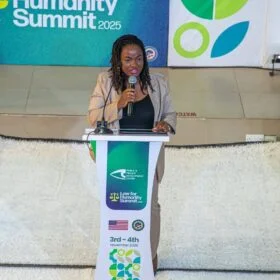The Chief Executive Officer, Public and Private Development Centre (PPDC), Lucy Abagi, has called for deeper collaboration between the bar and the bench, urging sustained funding to support pro-bono legal services.
Abagi made the call during the opening ceremony of the 2025 Law for Humanity Summit convened by the PPDC on Monday in Abuja.
Abagi said while progress had been made in strengthening access to justice, there was a need for sustained institutional support and funding to ensure long-term impact.
She said that stakeholders must confront existing gaps with courage and deepen collaboration between the bar, the bench, development partners and the private sector.
The CEO added that justice could not thrive on goodwill alone, but required structure, commitment and adequate resources.
She also added that pro-bono lawyers and duty solicitors continued to serve with passion and conviction, but even the most dedicated advocates are limited without sustainable funding.
“Therefore , we called for increased investment in legal aid and support systems, saying a fair and inclusive justice system depends on empowering those who give their time and expertise in service to others.”
Speaking on the summit, Abagi said that it was not just a gathering of professionals, adding that it was a celebration of service, of impact, and of humanity expressed through the practice of law.
“It is a moment to reflect on how, together, we are reshaping justice delivery in Nigeria through compassion, commitment, and collaboration.
“Our theme this year ‘The Quintessential Pro Bono Lawyer: Providing Value Without Compromising Professional Standards’ captures the very soul of ethical legal practice,” she said.
The PPDC CEO highlighted the achievements of the Reforming Pretrial Detention in Nigeria Project, Phase II (RPDN II), a PPDC-led initiative funded by the U.S. Department of State’s Bureau of International Narcotics and Law Enforcement Affairs (INL).
This, she said, had been instrumental in reducing unlawful and excessive pretrial detentions across the country.
“Across Nigeria, thousands of citizens remain in custodial centers awaiting trial, some for years. Through RPDN II, we have taken bold, evidence-based steps to reverse that trend,” she said.
According to her, at the heart of these achievements stand our pro bono lawyers, men and women whose work exemplifies the finest traditions of the legal profession.
“You are the ones who step into police stations and courtrooms often without recognition to speak for those who cannot speak for themselves.
“Your efforts have challenged unlawful detentions, secured bail for indigent suspects, prevented countless miscarriages of justice and ensured that due process is upheld, no matter who the client is.
“And you have done all this while maintaining the highest professional standards, demonstrating that ethical excellence and public service can coexist,” she said.
Abagi said that Through RPDN II, the network of pro bono lawyers had handled thousands of active cases across the states of implementation from minor offences to complex human rights violations.
She said that the lawyers were redefining what it means to be a legal professional in Nigeria not just practitioners of law, but defenders of dignity.
She said the PPDC has trained over 330 clinicians from 10 Law faculties, engaged over 200 pro bono lawyers and 50 police duty solicitors to provide specialised legal representation for indigent Nigerians.
“The 50 young lawyers serve as police duty solicitors across 50 police stations in five states have provided legal representation for 15,314 and secured bail for 8,552 arrested Nigerians.
“Over 5,595 detainees have been provided with free legal representation through the efforts of our dedicated pro bono lawyers.
“164 of those detainees have regained their freedom after years of detention. Each of these figures represents not just progress, but people’s lives saved, restored, families reunited, and faith in justice renewed,”she said.
According to her, as we reflect on these achievements, we must also look ahead. Our vision is that no Nigerian should ever remain in custody simply because they are poor or unrepresented.
She reiterated the commitment to continue to strengthen pro bono networks across all states, deepen partnerships with law enforcement agencies, and invest in the capacity of young lawyers and student clinicians to sustain the momentum.
“We are also exploring ways to leverage data analytics and technology to monitor pretrial detention trends in real time ensuring that justice system actors can respond quickly and effectively to violations.



